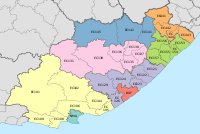Inkwanca Local Municipality
Inkwanca | |
|---|---|
 Location in the Eastern Cape | |
| Country | South Africa |
| Province | Eastern Cape |
| District | Chris Hani |
| Seat | Molteno |
| Wards | 4 |
| Government | |
| • Type | Municipal council |
| • Mayor | Mtandazo Qhaqmangwana |
| Area | |
| • Total | 3,584 km2 (1,384 sq mi) |
| Population (2011)[2] | |
| • Total | 21,971 |
| • Density | 6.1/km2 (16/sq mi) |
| Racial makeup (2011) | |
| • Black African | 89.1% |
| • Coloured | 4.1% |
| • Indian/Asian | 0.2% |
| • White | 6.2% |
| First languages (2011) | |
| • Xhosa | 85.8% |
| • Afrikaans | 8.3% |
| • English | 3.5% |
| • Other | 2.4% |
| Time zone | UTC+2 (SAST) |
| Municipal code | EC133 |
Inkwanca Local Municipality was a local municipality that forms part of the Chris Hani District Municipality in the Eastern Cape province of South Africa. Inkwanca is an isiXhosa name meaning cold. The municipal area is the coldest area in the country and the lowest temperatures are recorded in the area every year.[4] After municipal elections on 3 August 2016 it was merged into the larger Enoch Mgijima Local Municipality.
Geography
The municipality covers an area of 3,584 square kilometres (1,384 sq mi) in the Stormberg Mountains, approximately 200 kilometres (120 mi) northwest of East London. It abuts on the Gariep Local Municipality to the north, the Maletswai Local Municipality to the northeast, the Emalahleni Local Municipality to the east, the Lukhanji Local Municipality to the southeast and the Tsolwana Local Municipality to the southwest.
The population of the municipality according to the 2011 census was 21,971 people in 6,228 households. 89.1% of residents described themselves as "Black African", 6.2% as "White" and 4.1% as "Coloured". 85.8% speak Xhosa as their first language, 8.3% speak Afrikaans and 3.5% speak English. The two towns in the municipality are Molteno (pop. 11,553) and Sterkstroom (pop. 7,165).
Politics
The municipal council consisted of seven members elected by mixed-member proportional representation. Four councillors were elected by first-past-the-post voting in four wards, while the remaining three were chosen from party lists so that the total number of party representatives was proportional to the number of votes received.
2011 election
In the election of 18 May 2011 the African National Congress (ANC) won a majority of five seats on the council. The following table shows the results of the election.[5][6]
style="width: 2px; color:inherit; background-color: #006600;" data-sort-value="African National Congress" | style="width: 2px; color:inherit; background-color: #005BA6;" data-sort-value="Democratic Alliance (South Africa)" | style="width: 2px; color:inherit; background-color: #FFCA08;" data-sort-value="Congress of the People (South African political party)" | style="width: 2px; color:inherit; background-color: #FFB300;" data-sort-value="United Democratic Movement" || Party | Votes | Seats | ||||||
|---|---|---|---|---|---|---|---|---|
| Ward | List | Total | % | Ward | List | Total | ||
| ANC | 5,214 | 5,276 | 10,490 | 76.2 | 4 | 1 | 5 | |
| DA | 955 | 907 | 1,862 | 13.5 | 0 | 1 | 1 | |
| COPE | 708 | 667 | 1,375 | 10.0 | 0 | 1 | 1 | |
| UDM | – | 33 | 33 | 0.2 | – | 0 | 0 | |
| Total | 6,877 | 6,883 | 13,760 | 100.0 | 4 | 3 | 7 | |
| Spoilt votes | 114 | 108 | 222 | |||||
2014 election
On 11 September 2014 the Inkwanca municipal council was dissolved,[7] and new elections were held on 26 November.[8] The African National Congress (ANC) again won a majority of five seats on the council. The following table shows the results of the election.[9]
style="width: 2px; color:inherit; background-color: #006600;" data-sort-value="African National Congress" | style="width: 2px; color:inherit; background-color: #005BA6;" data-sort-value="Democratic Alliance (South Africa)" | style="width: 2px; color:inherit; background-color: #FFCA08;" data-sort-value="Congress of the People (South African political party)" | style="width: 2px; color:inherit; background-color: #ffb543;" data-sort-value="African Independent Congress" || Party | Votes | Seats | ||||||
|---|---|---|---|---|---|---|---|---|
| Ward | List | Total | % | Ward | List | Total | ||
| ANC | 4,192 | 4,166 | 8,358 | 63.3 | 3 | 2 | 5 | |
| DA | 1,125 | 1,127 | 2,252 | 17.1 | 1 | 0 | 1 | |
| COPE | 1,117 | 1,117 | 2,234 | 16.9 | 0 | 1 | 1 | |
| AIC | 172 | 188 | 360 | 2.7 | 0 | 0 | 0 | |
| Total | 6,606 | 6,598 | 13,204 | 100.0 | 4 | 3 | 7 | |
| Spoilt votes | 130 | 146 | 276 | |||||
References
- ^ "Contact list: Executive Mayors". Government Communication & Information System. Archived from the original on 14 July 2010. Retrieved 22 February 2012.
- ^ a b "Statistics by place". Statistics South Africa. Retrieved 27 September 2015.
- ^ "Statistics by place". Statistics South Africa. Retrieved 27 September 2015.
- ^ South African Languages - Place names
- ^ "Results Summary – All Ballots: Inkwanca" (PDF). Independent Electoral Commission. Retrieved 24 November 2013.
- ^ "Seat Calculation Detail: Inkwanca" (PDF). Independent Electoral Commission. Retrieved 24 November 2013.
- ^ Zuzile, Mphumzi; Loewe, Mike (11 September 2014). "Mayhem as council sacked". Daily Dispatch. Retrieved 8 January 2015.
- ^ "By-elections because of dissolved municipalities". The Citizen. Sapa. 16 October 2014. Retrieved 8 January 2015.
- ^ "Seat Calculation Detail: Inkwanca". Independent Electoral Commission. Retrieved 8 January 2015.


